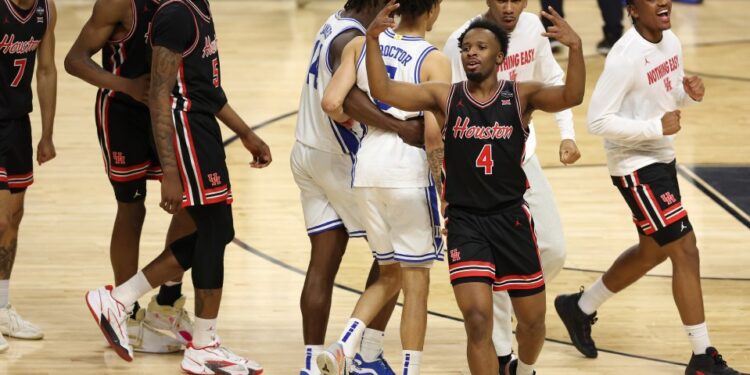In a stunning development that has sent shockwaves through college basketball, the NCAA has handed down a bombshell ruling following the highly controversial Final Four showdown between the Duke Blue Devils and the Houston Cougars. The ruling comes amid mounting outrage over a series of questionable officiating decisions that many believe changed the course of the game—and potentially the tournament itself.
The Flashpoint
The tipping point came in the game’s closing moments, with Duke clinging to a narrow lead. As freshman phenom Cooper Flagg leapt for a crucial rebound, officials whistled him for an over-the-back foul on Houston’s J’Wan Roberts—a call that analysts across the country have since labeled “phantom” and “game-altering.” The foul sent Roberts to the line, where he calmly sank two free throws, giving Houston a late lead they would not relinquish.
What followed was an eruption of fury from Duke fans, stunned silence from the SEC officiating office, and a firestorm of criticism from national pundits who questioned how such a pivotal call could be made in a moment of such magnitude.
NCAA Launches Emergency Review
In response to the uproar, the NCAA convened a special review panel less than 24 hours after the game. Their findings were damning: multiple officiating errors, inconsistent foul assessments, and a failure to adhere to NCAA standards of review in the final two minutes. As a result, the NCAA announced the immediate suspension of the entire officiating crew that handled the Duke-Houston game—an extraordinary move that underscores the gravity of the situation.
According to insider sources, the NCAA found that not only was the call on Flagg highly questionable, but two prior missed fouls on Houston players went uncalled—both of which could have altered the final score in Duke’s favor.
Fans and Analysts Erupt
The ruling has only intensified calls for reform. Across social media, the hashtag #JusticeForDuke began trending within minutes of the NCAA’s announcement. College basketball legends, former players, and even current coaches have weighed in, calling for transparency in referee training, real-time video oversight, and a formal appeals process for postseason games.
Longtime Duke coach Jon Scheyer, speaking carefully but firmly, remarked, “We teach these young men to play the game the right way. They deserve the same from those calling it.”
SEC Under Fire
Though the game involved an ACC team and an AAC team, the referees in question were part of a rotational officiating crew used across conferences—including the SEC. The fallout has brought unwanted scrutiny to the Southeastern Conference, with critics accusing it of supplying inconsistent officiating talent to critical March Madness matchups.
The SEC issued a brief statement promising to “review and reassess officiating protocols moving forward,” but many fans and insiders have interpreted the language as vague and insufficient given the magnitude of the controversy.
What’s Next?
While Houston advances to the national championship, the legitimacy of their path is now clouded by controversy. For Duke, the bitter end to a promising run led by a generational talent like Cooper Flagg will sting for years—especially as video replays continue to circulate, fueling the narrative that the Blue Devils were robbed on college basketball’s biggest stage.
Some have even gone further, calling for the NCAA to adopt sweeping structural changes—including the use of independent, neutral officiating panels for all tournament games and post-game accountability reviews.
One thing is certain: This scandal has cast a long shadow over March Madness 2025. And while the championship may still be up for grabs, the integrity of the tournament itself has taken a serious hit.














